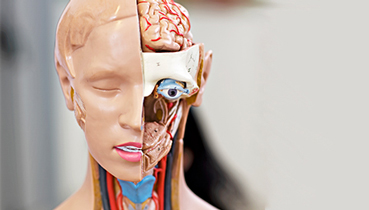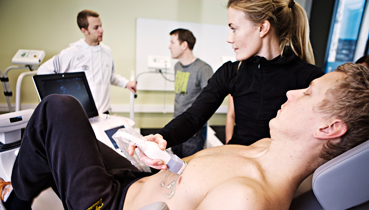Department of Neuroscience - Faculty of Medicine
Research
The research at the institute of neuro medicine and movement involves both healthy persons with and without disability, patients and health professionals. Our work contributes to the promotion of health and ability, and illness prevention, and to develop more targeted treatment and rehabilitation. This encompasses everything from basic and translation research to clinical and practical research. Research and development within education is an area of focus.
Fagenheter
Research unit for professional studies: audiology, occupational therapy and physiotherapy
The research span from health promotion and prevention to treatment and rehabilitation, and covers the life course from children and youth to the elderly. we develop and convey new knowledge about people, groups, organisations and societal conditions
Research unit for geriatrics, movement and stroke (GeMS)
The research focus on causes and recognition of movement difficulty, and measures to reduce movement disability caused by medical illness or status.
Research unit for neurology and neurosurgery
This priority programme research illnesses where certain groups of nerve cells gradually die or change function. The most known illnesses are dementia, Parkinson’s disease, Huntington’s disease and motorneurodisease.
Research unit for orthopaedics and rheumatology
This is a heterogenous research unit, with a common denominator in clinical research for the benefit of improved patient treatment.
Research unit for ear - nose - throat, eye diseases and oral surgery
The research unit treat illnesses of both medical and surgical nature within the entire head and neck area, and is responsible for the treatment of these illnesses in the central Norwegian health region.
Research Groups at the Department
Movement analysis (Move)
Cellular toxicology
Falling among the elderly (Farseeing)
Head injuries (TBI-group)
Jaw surgery and mouth diseases
Clinical neurophysiology
Women’s network for technology and communication in health research
Metabolic neuroscience
National competence service for headache
Neurosurgery
Observation and rehabilitation after stroke (LAST/LEAST)
Orthopaedic surgery
Centre for elite sports research (SenTIF)
TrønderBrain – Dementia and Parkinson’s disease in Trøndelag
WE-study: Does botulinum toxin make walking easier in children with cerebral palsy?
Ear-nose-throat diseases
Eye diseases

Ph.d. education
More than 100 ph.d. candidates are associated to the Department of neuromedicine and movement science.
The ph.d. education at the Faculty of Medicine and Health Sciences.

